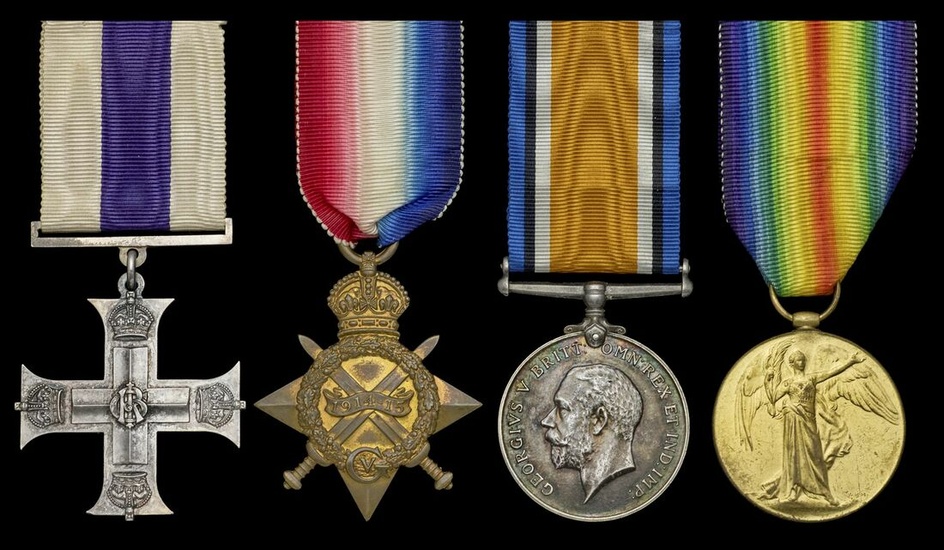A Great War M.C. group of four to Captain G. E. Tower, Royal Field Artillery, who rowed at Stro...
A Great War M.C. group of four to Captain G. E. Tower, Royal Field Artillery, who rowed at Stroke for the Cambridge VIII in the 1914 Boat Race, the final race before the Great War, which took the lives of half of the Cambridge Boat that had won on the River Thames
Military Cross, G.V.R.; 1914-15 Star (Lieut. G. E. Tower. R.F.A.); British War and Victory Medals (Capt. G. E. Tower.), extremely fine (4)
M.C. London Gazette 18 July 1918:
'For conspicuous gallantry and devotion to duty. When his battery was being heavily and accurately shelled he maintained its fire with the greatest courage and determination.'
Geoffrey Egerton Tower was born on 23 November 1891 in Ellesmere, Shropshire and went up to Trinity College, Cambridge University. A highly proficient rower, he was a member of the Cambridge University Boat Crew in 1914, when he took the Stroke Seat. On 28 March 1914, Cambridge won the toss and elected to start from the Surrey station, handing the Middlesex side of the river to Oxford. In bright sunshine, a light wind and smooth water, umpire Pitman started the race at 1420hrs. Although rating slower than Oxford, Cambridge took a lead and were three-quarters of a length ahead by Craven Steps. They extended their lead to a length and a quarter by the Mile Post and continued to pull away as they passed below Hammersmith Bridge. According to Drinkwater, '...they took things easy in the rough water' towards Barnes Bridge and went on to pass the finishing post four and a half lengths ahead. It was to be a seminal Boat Race, one that was not to take place again until 1920. Half of the winning Cambridge Crew that Tower would have known were killed. During the conflict, at least 42 Blues were killed.
Tower served overseas in France from 22 November 1915 with the Royal Field Artillery (Cheshire Brigade), which he remained with throughout his Great War service. Tower relinquished his commission on 5 February 1919. He applied for his medals in December 1924 and they were sent to the Cavendish Club, 119 Piccadilly, London W1. Tower returned to live in Ellesmere, Shropshire and died on 14 October 1949.
Subject to 20% VAT on Buyer’s Premium. For more information please view Terms and Conditions for Buyers.
View it on
Sale price
Estimate
Reserve
Time, Location
Auction House
A Great War M.C. group of four to Captain G. E. Tower, Royal Field Artillery, who rowed at Stroke for the Cambridge VIII in the 1914 Boat Race, the final race before the Great War, which took the lives of half of the Cambridge Boat that had won on the River Thames
Military Cross, G.V.R.; 1914-15 Star (Lieut. G. E. Tower. R.F.A.); British War and Victory Medals (Capt. G. E. Tower.), extremely fine (4)
M.C. London Gazette 18 July 1918:
'For conspicuous gallantry and devotion to duty. When his battery was being heavily and accurately shelled he maintained its fire with the greatest courage and determination.'
Geoffrey Egerton Tower was born on 23 November 1891 in Ellesmere, Shropshire and went up to Trinity College, Cambridge University. A highly proficient rower, he was a member of the Cambridge University Boat Crew in 1914, when he took the Stroke Seat. On 28 March 1914, Cambridge won the toss and elected to start from the Surrey station, handing the Middlesex side of the river to Oxford. In bright sunshine, a light wind and smooth water, umpire Pitman started the race at 1420hrs. Although rating slower than Oxford, Cambridge took a lead and were three-quarters of a length ahead by Craven Steps. They extended their lead to a length and a quarter by the Mile Post and continued to pull away as they passed below Hammersmith Bridge. According to Drinkwater, '...they took things easy in the rough water' towards Barnes Bridge and went on to pass the finishing post four and a half lengths ahead. It was to be a seminal Boat Race, one that was not to take place again until 1920. Half of the winning Cambridge Crew that Tower would have known were killed. During the conflict, at least 42 Blues were killed.
Tower served overseas in France from 22 November 1915 with the Royal Field Artillery (Cheshire Brigade), which he remained with throughout his Great War service. Tower relinquished his commission on 5 February 1919. He applied for his medals in December 1924 and they were sent to the Cavendish Club, 119 Piccadilly, London W1. Tower returned to live in Ellesmere, Shropshire and died on 14 October 1949.
Subject to 20% VAT on Buyer’s Premium. For more information please view Terms and Conditions for Buyers.



